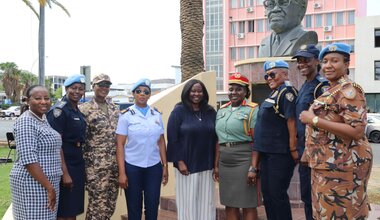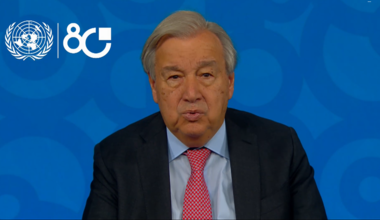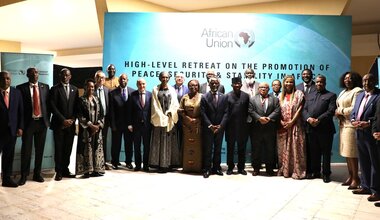Outcome Document of the 15th AU High-Level Retreat on Preventive Diplomacy and Mediation | 24-26 October 2024 | Abidjan, Côte d’Ivoire
Over the course of this two-day retreat, participants engaged in in-depth discussions on the role of preventive diplomacy and mediation in addressing Africa’s peace and security challenges. Key discussions emphasized trust-building, complementarity, and inclusivity in peace processes, underscoring the importance of multilateralism, self sustainability, women and youth engagement, and the reinforcement of democratic institutions as crucial pillars for stability and progress across the continent.
Summary of Key Discussion Points and Recommendations:
1. State of Peace and Security in Africa:
Participants expressed grave concern over the shrinking political space, the frequency of coups, particularly in West Africa, where instability has been exacerbated by weak democratic institutions, exclusion, youth disenchantment, and deep-seated historical grievances. Participants emphasized that conflict and unrest across the continent are driven by factors such as trust deficits, societal fragmentation, and dogmatism, which are further worsened by external geopolitical rivalries and competing economic interests that fuel instability. Globally, the number of conflicts is on the rise, and as a consequence, military spending is record high depriving governments of the fiscal space to provide services.
2. Multilateralism and Self-Sustainability:
The retreat highlighted Africa’s continued reliance on external support for peace and security efforts. There was a strong call for Africa to build greater self-reliance by developing its own solutions to these challenges. Simultaneously, multilateralism was underscored as essential for tackling global challenges such as terrorism, violent extremism, climate change, and economic crises, with an emphasis on the need for scaling up of African leadership in multilateral engagements.
3. Strengthening the UN-AU Partnership:
The UN-AU Joint Framework for Enhanced Partnership in Peace and Security was showcased as a cornerstone for collaborative responses to peace and security challenges. Additionally, discussions on financing of AU-led peace operation with a call for UN peace initiatives to be contextually adapted to Africa’s unique circumstances. A call was made for the UN Security Council to align more closely with the values enshrined in the UN Charter.
4. Regional and Continental Collaboration:
The retreat highlighted the need for greater complementarity between the AU and regional bodies. There was a particular focus on the challenges facing ECOWAS, with a hopeful outlook toward the reintegration of Burkina Faso, Mali, and Niger into the AU and ECOWAS, recognizing their critical roles in regional stability.
5. Youth Engagement and Reintegration:
With Africa’s demographics shifting rapidly, participants stressed the urgent need to address youth issues, particularly in reintegration. Opportunities for youth engagement and support were seen as essential to fostering long-term stability on the continent.
6. Inclusive Peace Processes:
The retreat emphasized that achieving sustainable peace in Africa depends on the meaningful inclusion of women, youth, and a wide range of societal groups in peace processes. While progress has been made in increasing women’s participation in mediation and preventive diplomacy, significant institutional barriers still hinder their full involvement. The launch of the WiseYouth Network was celebrated as a major milestone, furthering the African Union’s objectives for youth engagement in peace and security. Additionally, the formal integration of civil society actors into these processes was highlighted as essential, allowing community voices to contribute directly to peacebuilding efforts and ensuring that outcomes are both comprehensive and enduring.
7. Culturally Relevant Approaches to Peace:
Participants underscored that approaches to conflict resolution should reflect African values and traditions, as these are fundamental to the success and sustainability of peace processes on the continent.
8. Economic and Social Commitments:
It was reiterated that the AU must maintain its commitment to economic development as an integral part of its peace and security agenda, recognizing that economic and social resilience are key to addressing root causes of instability.
9. Addressing Emerging Threats:
The growing impacts of climate change were identified as significant emerging threats that will require adaptations in traditional peace and security approaches. Participants emphasized the importance of enhancing the AU’s capacity to address climate-related challenges, noting that fragmented efforts among peacebuilding and humanitarian actors further complicate effective responses.
In conclusion, the Retreat reaffirmed the African Union’s commitment to advancing African-led, inclusive, and sustainable peace efforts. Participants underscored the need for self-reliance, strengthened multilateral partnerships, and the active involvement of women, youth, and civil society in peace processes. The retreat called for enhanced collaboration between the AU, Regional Economic Communities/Regional Mechanisms, and the UN, ensuring peace initiatives reflect Africa’s priorities and interests.
 UN
UN






